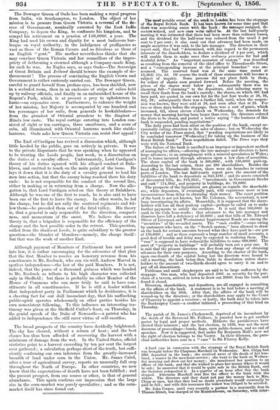The Earl of Cardigan has revived a discussion which, although
little heeded by the public, goes on actively in private. It was to the private disputants that he was speaking when he appeared to be treating the Leeds people, last week, to a dissertation on the duties of a cavalry officer. Unfortunately, Lord Cardigan's theory of his duties squared with his alleged conduct at Bala- klava, and omitted to touch on the main point of the issue. He lays it down that it is the duty of a cavalry general to lead his men into action, but that the enemy being reached there his duty ends : he is not responsible for the conduct of the second line, either in making or in returning from a charge. Now the alle- gation is, that Lord Cardigan acted on this theory at Balaklava. Although he was one of the first to reach, he is also said to have been one of the first to leave the enemy. In other words, he led the charge, but he did not rally the scattered regiments and fol- low them—he preceded them out of the fatal valley. His theory is, that a general is only responsible for the direction, compact- ness, and momentum of the onset. We believe the correct theory is, that a brigadier is responsible for the efficiency of the charge and the best possible order in the retreat. This question, called from the shades at Leeds, is quite subsidiary to the greater question—the blunder of blunders—namely, the charge itself : but that was the work of another Earl.


































 Previous page
Previous page